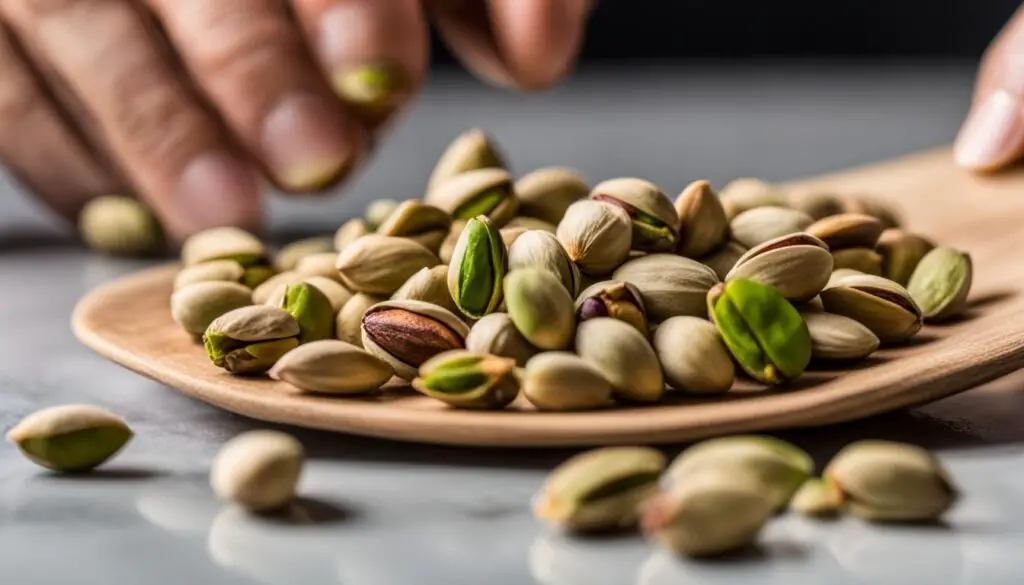If you love snacking on pistachios, you may have wondered if they can cause heartburn. Heartburn, characterized by a burning sensation in the chest, is often caused by acid reflux when stomach acid and food flow back up into the esophagus. While nuts, including pistachios, can be a trigger for heartburn symptoms, it’s essential to understand why and how they may affect you.
The connection between pistachios and heartburn lies in their high fat content. Nuts high in fats, like pistachios, can contribute to acid reflux and temporarily worsen reflux symptoms. However, it’s important to note that it would require significant nut consumption for this to become a problem. Almonds, despite being higher in fat, may be less likely to worsen reflux symptoms due to their alkaline nature compared to acidic nuts.
Managing heartburn caused by pistachios involves practicing portion control and choosing lower-fat options. By enjoying pistachios in moderation and opting for other nuts like almonds, individuals can still savor their nutty snacks without triggering heartburn symptoms.
Key Takeaways:
- Pistachios can contribute to acid reflux and worsen heartburn symptoms temporarily due to their high-fat content.
- Almonds, despite being higher in fat, may be a better option as they are alkaline and less likely to worsen reflux symptoms.
- To manage heartburn caused by pistachios, practice portion control and choose lower-fat nuts.
- Other factors that contribute to heartburn include fried or fatty foods, chocolate, alcohol, coffee, carbonated beverages, tomato sauce, citrus fruits or juices, and certain medications.
- Avoiding triggers, practicing portion control, and making lifestyle changes can help prevent and manage heartburn effectively.
The Connection Between Nuts and Heartburn
When it comes to heartburn, understanding the connection between nuts, including pistachios, and its potential triggers is essential. Consuming a large amount of nuts, particularly those high in fat like pistachios, can temporarily worsen esophageal symptoms for individuals with reflux disease.
One of the reasons nuts can aggravate reflux symptoms is their fat content. Fat is known to relax the sphincter in the esophagus, which can promote reflux. However, it is important to note that significant consumption of nuts is typically required for this to become a problem.
Despite having higher fat content, almonds may be less likely to worsen reflux symptoms compared to other nuts because they are alkaline rather than acidic. In contrast, pistachios contain about 12.8 grams of fat per ounce, which is relatively moderate compared to cashews, peanuts, and almonds.
Comparing Fat Content of Nuts (per ounce)
| Nut | Fat Content (grams) |
|---|---|
| Pistachios | 12.8 |
| Cashews | 12.4 |
| Peanuts | 14.0 |
| Almonds | 14.0 |
While the fat content of pistachios is relatively moderate, individuals who experience heartburn should still exercise portion control when consuming nuts, including pistachios. Being mindful of nut intake and choosing lower-fat nuts can help manage heartburn caused by pistachios.
It’s important to note that heartburn can have various triggers beyond nuts. Factors such as consuming fried or fatty foods, chocolate, alcohol, coffee, carbonated beverages, tomato sauce, and citrus fruits or juices can contribute to or worsen heartburn symptoms. Other lifestyle choices, such as eating large meals, lying down within a few hours after eating, wearing tight clothing that puts pressure on the stomach, taking certain medications like aspirin, and smoking, can also play a role in heartburn development.
By understanding the pistachio heartburn connection and considering other contributing factors, individuals can make informed choices to prevent and manage heartburn effectively.
Other Factors That Contribute to Heartburn
- Understanding pistachios and heartburn
- Pistachio-induced heartburn
- Managing heartburn caused by pistachios
- Preventing heartburn from pistachio consumption
While pistachios can be a potential trigger for heartburn, it’s important to note that there are other factors that can contribute to this condition as well. By understanding these additional triggers and making necessary lifestyle modifications, individuals can effectively manage and prevent heartburn.
Fried or fatty foods, chocolate, alcohol, coffee, carbonated beverages, tomato sauce, and citrus fruits or juices are known to contribute to or worsen heartburn symptoms. These foods and drinks can increase acid production in the stomach and relax the lower esophageal sphincter, which allows stomach acid to flow back into the esophagus, causing heartburn.
In addition to food and drink choices, other factors to consider include:
- Eating large meals: Overeating can put pressure on the stomach, promoting the backward flow of stomach acid into the esophagus.
- Lying down within a few hours after eating: Gravity helps keep stomach acid in the stomach when standing or sitting upright. Lying down too soon after a meal can lead to acid reflux.
- Wearing tight clothing: Tight clothing, especially around the waist and abdomen, can put pressure on the stomach and contribute to heartburn.
- Taking certain medications: Some medications, such as aspirin or nonsteroidal anti-inflammatory drugs (NSAIDs), can irritate the stomach lining and increase the risk of heartburn.
- Smoking: Smoking weakens the lower esophageal sphincter and increases the production of stomach acid, making heartburn more likely to occur.
To manage and prevent heartburn, it is important to avoid these triggers and practice portion control when consuming foods that can potentially cause heartburn, including pistachios. By making informed dietary choices and adopting a healthy lifestyle, individuals can minimize the risk of experiencing pistachio-induced heartburn and improve overall digestive health.

Conclusion
Pistachios and other nuts high in fat can potentially exacerbate reflux and trigger heartburn symptoms temporarily. However, managing heartburn involves practicing portion control and opting for lower-fat nuts. Almonds, despite their higher fat content, may be a preferable choice as they are alkaline, unlike acidic nuts.
It is also crucial to consider other contributing factors and triggers for heartburn and make necessary lifestyle changes. Avoiding fried or fatty foods, chocolate, alcohol, coffee, carbonated beverages, tomato sauce, citrus fruits or juices, eating large meals, lying down soon after eating, wearing tight clothing, taking specific medications, and smoking can also aid in preventing heartburn caused by pistachios or other triggers.
By understanding the connection between pistachios and heartburn, individuals can effectively prevent or manage heartburn symptoms. By practicing moderation, choosing lower-fat nuts like almonds, and avoiding known triggers, individuals can enjoy the health benefits of pistachios without experiencing discomfort from pistachio-induced heartburn.
FAQ
Can pistachios cause heartburn?
Nuts, including pistachios, may be the culprits behind heartburn symptoms. Pistachios high in fat can contribute to acid reflux and worsen reflux symptoms temporarily. Choosing lower-fat nuts and eating them in moderation can help manage heartburn caused by pistachios.
What is the connection between nuts and heartburn?
Fat is a trigger for relaxing the sphincter in the esophagus, which can promote reflux. If someone with reflux disease consumes a large amount of nuts, including pistachios, their esophageal symptoms may worsen temporarily. However, it would require significant nut consumption for this to become a problem. Almonds, despite being higher in fat, may be less likely to worsen reflux symptoms because they are alkaline and not acidic. Pistachios, with 12.8 grams of fat per ounce, are relatively moderate compared to cashews, peanuts, and almonds.
What other factors contribute to heartburn?
Aside from pistachios or nuts, other triggers for heartburn include fried or fatty foods, chocolate, alcohol, coffee, carbonated beverages, tomato sauce, and citrus fruits or juices. Other factors to consider include eating large meals, lying down within a few hours after eating, wearing tight clothing that puts pressure on the stomach, taking certain medications like aspirin, and smoking.
How can I manage and prevent heartburn caused by pistachio consumption?
By avoiding trigger foods, including pistachios, and practicing portion control with nuts, individuals can better manage and prevent heartburn. It’s important to choose lower-fat nuts and consider other factors and triggers that contribute to heartburn. Making lifestyle changes such as avoiding trigger foods, eating smaller meals, and not lying down immediately after eating can also help prevent heartburn symptoms.
